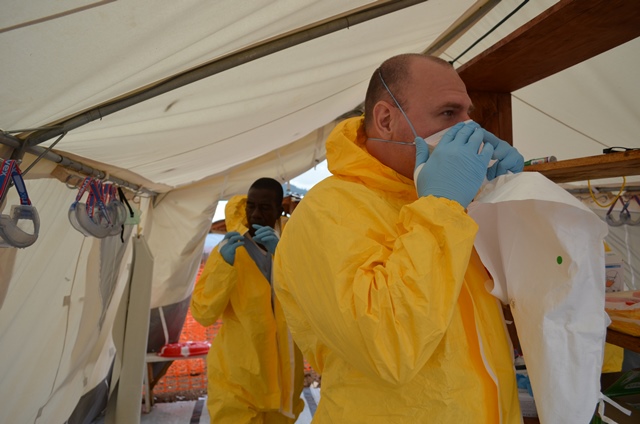
Windsor, Ontario, physician Dr. Tim Jagatic has spent recent months on the front lines of a major international medical crisis, one that has created fear in the countries most affected and worries about its potential to spread. But while Jagatic is emphatic that the Ebola epidemic currently underway in West Africa is an emergency that demands immediate global action, he also points out that fighting the disease is not the stuff of a Hollywood medical thriller.
“Most people think that Ebola is this dramatic, hemmorhagic disease, where you’re going to see blood coming out of every orifice,” says Jagatic, a doctor with the international medical organization Médecins Sans Frontières/Doctors Without Borders (MSF) who was among the first physicians on the ground in Guinea when the outbreak was first announced in that country, and who has since returned to West Africa to help with MSF’s efforts against Ebola in Sierra Leone.
MORE: BREAKING DOWN BARRIERS TO MENTAL HEALTHCARE
The reality of the symptoms Jagatic has seen in his patients is far less sensational, something that helped him see the battle against Ebola as one that could be won. “Really what I was seeing was patients with dizziness, nausea, diarrhea, vomiting, aches and pains, and very non-specific symptoms,” he says. “So when I was seeing them, and seeing these symptoms that were very manageable, I really had a sense of optimism right from the beginning.”
Prior to the current epidemic, most Ebola outbreaks were contained before they could become too widespread. But it is a devastating disease, one that is highly contagious and has historically killed up to 90 per cent of people it infects. This high mortality rate is part of the reason Ebola creates such panic in affected communities, especially since there is as of yet no developed vaccine or specific treatment for the disease.
But Jagatic insists that does not mean Ebola can’t be treated, and says it is wrong to assume those infected are doomed to die. In fact, many of the patients who defeat the virus do so with the help of very basic treatment.
“We use supportive therapy,” he says. “We have people come in with these non-specific symptoms, and we treat them as they come. So if somebody comes in with diarrhea, we provide them with fluid resuscitation. If they have a fever, we give them Tylenol. It’s very simple stuff. And it’s very effective.”
Indeed, Jagatic says that when such simple measures are used for patients in early stages of the virus incubation period, the effect can be dramatic. “These types of measures brought us down from a 90 per cent mortality rate to a 50 per cent mortality rate. So it’s very hopeful to see that some of these basic things can bring the mortality rate down.”
Despite such reasons for optimism, Jagatic acknowledges that working on the front lines against a highly contagious disease that remains out of control is difficult, psychologically as well as physically. Not only do the hot, heavy and anonymous protective suits medical staff must wear take their toll, so does the constant worry about becoming infected.
MORE: WHEN CULTURE GETS IN THE WAY OF CHANGE
Fortunately, Jagatic says, MSF’s infection control protocols are very strict, which can help staff take ownership of their own mental wellbeing. “You have to be prepared for the mental games your mind will play on you,” he says. “But you can manage that by paying attention to the steps in the process, taking note of each one, and checking them off. So that later on, when you’re lying in bed and wondering, ‘Did I do something risky?’ you can think back and know you did everything in order.”
If the fight against Ebola is to succeed, it will require a large increase in the number of qualified personnel on the ground. For his part, Jagatic is more than ready to continue doing what he can to help. Having returned from Guinea last spring and from Sierra Leone in August, he plans to head back to West Africa with MSF this fall.
“I’m just trying to do what I can with what I’ve got,” he says. “If I can help, I’ll help.”
And while he knows Ebola requires the special attention of the international medical community right now, Jagatic will continue to pursue humanitarian medical work wherever he is most needed. “If there’s somebody ill and you can help them,” he says, “there’s satisfaction in that. It doesn’t matter what the disease is.”


Comments are closed.